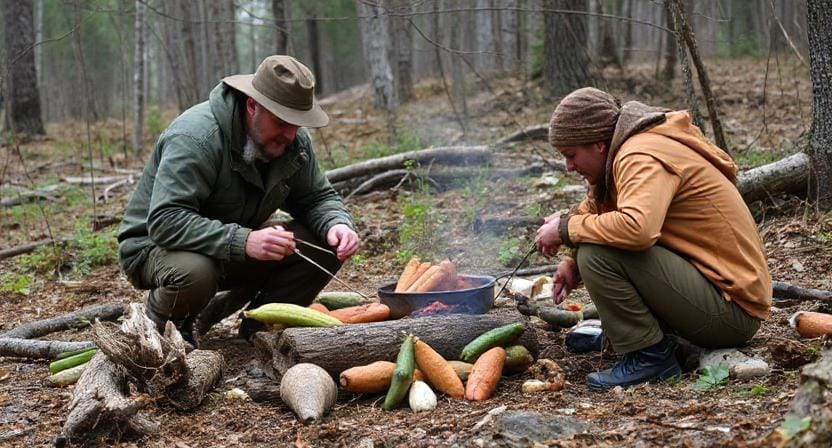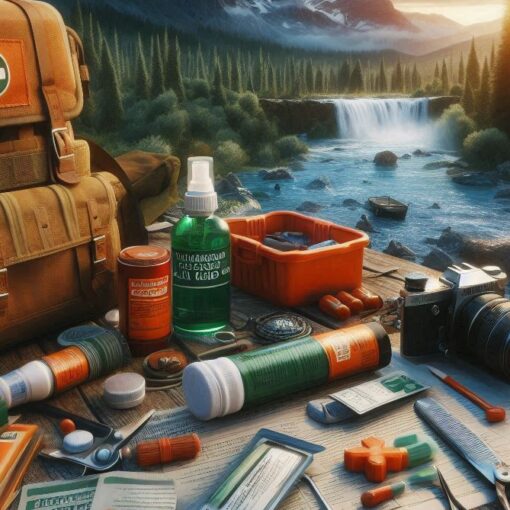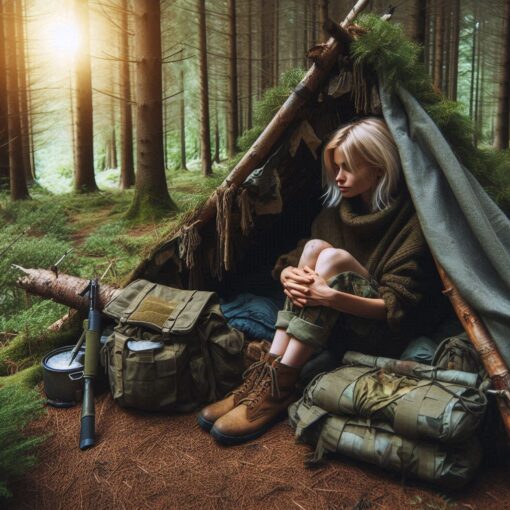Top Takeaways and Key Concepts
- Learn essential survival skills like fire building, gardening, and water purification before going off-grid.
- Gather food safely by learning to forage, fish, hunt small game, or grow a garden.
- Secure clean water using rain collection, natural sources, and purification methods.
- Build reliable shelter to protect against weather using tents, tarps, or natural materials.
- Master fire making to stay warm, cook food, and purify water in the wilderness.
Summary of This Article
This article explains the practical skills needed to live off the grid and thrive in nature. It emphasizes preparing by learning how to forage, fish, or garden for food, and finding clean water using rain collection or filtration methods. It also highlights building strong, insulated shelters to stay safe from weather and the importance of mastering fire-making techniques for warmth and survival. Overall, living off-grid is achievable with preparation, patience, and a strong survival mindset.
Short Video Version of this Article
Hey there, fellow travelers! Have you ever thought of just walking away from everything? Imagine a lovely cabin in the woods with tall trees, birds singing, and a clear blue sky. No cars speeding by, no notifications buzzing. Just calm. Not bad, huh?
Please Note: This post may contain affiliate links. If you click one of them, we may receive a commission at no extra cost to you. As an Amazon Associate, I earn from qualifying purchases.
But let’s take a second to think about this. It sounds great to live off the grid, but it’s not as simple as giving up your phone for a fishing rod. It goes a lot deeper than that. You need to know how to do things. Making plans. Think about trying to catch dinner without knowing how to fish. Oh no!

You should learn some simple things. Things like growing food, creating a fire, or making water safe to drink. What if it rains for days on end? Have you ever tried to make a shelter? It doesn’t seem like it would be easy. And can you get about in the woods without a map?
Get your bag. Let’s do it! Take little measures at first. You might want to start by learning how to grow herbs on your windowsill. Or you might practice starting a fire in your yard. Every little bit helps. Every one of them gets you closer to that dream.
It might be magical to live in nature, but being ready makes it even better. You can feel more at home in the woods if you know how to handle problems when they come up. So, let’s get started and find out how to genuinely do well without contemporary comforts!
Food Gathering: Nature’s Bounty

Let’s talk about gathering food first. If you’re going off the grid, it’s really important to know where your next meal will come from. Imagine wandering through a green forest where berries are ready to be picked or fish are swimming in a stream nearby. That’s pretty cool, right?
Foraging is an art that takes time to learn, but it can be quite rewarding. You should learn about the plants in your area that you can eat, such wild berries, mushrooms (but make sure they’re not dangerous!), and nuts.
Do you remember when I thought a mushroom was dinner? Spoiler alert: it didn’t turn out well! So, before you eat something you encounter in the wild, always do your homework.
Fishing is another great way to eat and enjoy the peace and quiet of nature. You may catch meals with a basic fishing rod or even make your own traps.
And hey, if you don’t like fishing, guess what? Those tiny squirrels are everywhere! They could be annoying, but they can also be food. Just remember to look up the rules in your area before you go after them. There are rules for some places. You don’t want to get in trouble over a dinner!
If you want to stay for a while, cultivating your own food is a great option. It can be intimidating to start a garden at first. But remember that you’re taking care of little green pals who will feed you later! You only need some seeds and some time.
Picture going outside and picking fresh tomatoes or crunchy cucumbers right from your garden. That’s really cool, right? Imagine how pretty those multicolored vegetables would look on your dish!
When you live off the grid, the best thing to do is to use nature’s food sources, like foraging, fishing, or gardening. It helps you feel like you belong to the earth and can take care of yourself. You’ll discover more about what nature has to offer, and that feels good!
Water Sourcing: Liquid Life

The next step is getting water, which is essential for life. Even the best survivalist won’t stay long without clean water (and trust me, no one wants to get dehydrated). So, how can we make sure we stay hydrated when we can’t use contemporary plumbing?
One good way to do this is to set up barrels or containers around your home base to catch rainwater. Just picture yourself standing outside in the rain with buckets ready, like you’re catching nature’s gifts right from the sky! Before you drink this valuable resource, make sure you filter it. No one likes strange particles floating about in their cup.
Another choice is to look for natural water sources, such as rivers or streams, that are close by. Always look for indicators of contamination upstream (you don’t want to drink from a place where someone else threw away their trash!). Carrying portable water filters might also help you avoid unpleasant surprises that may be hiding in dirty water.
It’s kind of crazy to believe that people can only live for three days without water. Only three! That makes it very crucial to drink enough water when you’re off-grid. So, get as much water as you can. Stay hydrated!
And this might sound ridiculous, but it really helps. Learn how to tell when it’s dry. Knowing how the weather works can greatly help you. When you need fresh water, you don’t want to be in a dry spell. Think about what it would be like to run out and then look for a drop. Oh no!
When you live in the wild, it’s important to find clean water. There are many methods to do it. It could be gathering rainwater or figuring out how to clean what you find. You want to be prepared, don’t you? These tricks make a big difference.
So, watch the skies. Stay alert. Learn how to make sure you have all the water you need.
Shelter Building: Home Sweet Home

Now let’s talk about building a shelter, because it’s important to have a safe place to sleep after a day of exploring. You wouldn’t sleep outside every night unless you really like looking at the stars (or avoiding insects).
When picking a place to sleep, search for flat terrain that is far away from things that could hurt you, including falling branches or regions that could flood (no one enjoys waking up wet!). Depending on how skilled you are and what materials you have, you can choose between tents, tarps, and more permanent buildings built of logs or stones.
If you’re feeling creative (and courageous), try making a basic lean-to out of branches leaning against trees. It’s not as hard as it sounds! Just make sure it protects you well from wind and rain so you don’t wake up feeling like an ice cube.
When you live off the grid, insulation is really important. Think about how cold it is outside. Putting leaves or grass inside your shelter? That’s a game-changer for comfort! It keeps you warm. Those same leaves also keep mosquitoes away on hot summer nights. That’s a double win, right?
And don’t forget about fire pits! They aren’t just for roasting marshmallows, though they are good! They make the place feel lovely. Imagine it: a fire crackling and stars above. It’s very nice. Fires also keep you warm and are great for cooking. You can create some good soups or just heat up leftovers.
It certainly helps to build a strong shelter. It changes your off-grid trip from just getting by to having fun. A good spot to sleep, a warm fire, and some insulation? That’s the life! Believe me, you’ll feel so much better!
Fire Making: The Heartbeat of Survival
Speaking of comfortable, starting a fire merits its own section in our guide to off-grid adventures! Fire isn’t just for roasting marshmallows; it’s also important for keeping you warm, cooking food safely, and cleaning water. Oh, and it also keeps animals away from your campfire party!
There are numerous ways to make a fire, depending on what equipment you have on hand. If you’re lucky, you could have matches or lighters. If not, you might use flint and steel, which take practice but work well once you get the hang of them.
A good piece of advice? Before you start a fire, gather dry tinder like leaves or small twigs. There’s nothing worse than trying to blow air into wet logs in the hopes that they’ll miraculously catch fire. It doesn’t work, people!
But once it is lit? You can’t beat this kind of experience: sitting around a fire with friends and telling stories while looking up at the stars.
Making fires is a big deal. It makes a big difference. Just imagine standing next to a warm fire and roasting marshmallows while the flames dance. That’s a lot more than merely living. It’s about having fun outside.
You have a lot on your mind, don’t you? Finding clean water and food. Making somewhere to stay. And then learning how to start a fire. That’s a lot! But believe me, once you get the hang of it, you’ll feel like Bear Grylls, but without the camera team.
Getting ready for this significant transition is quite important. You should feel strong and ready in both your mind and your body. It’s definitely a journey.
Take a breath and enjoy the great moments through it all. If you let it, nature may grab your heart. So get out there, have fun, and make some memories!
Living off the grid requires more than a dream of peace and nature—it takes real survival skills. Before disconnecting from modern life, you must learn how to find food, purify water, build shelter, and make fire. With the right preparation and mindset, you can live independently and thrive in the wilderness.
Frequently Asked Questions
What skills do I need before living off the grid?
You should learn essential skills like gathering food, purifying water, building shelters, and starting fires safely before attempting off-grid living.
How can I find food in the wilderness?
You can find food by foraging edible plants, fishing, hunting small game, and growing a small garden for long-term sustainability.
What is the safest way to get clean water in nature?
Collect rainwater when possible and always purify water from streams or rivers using filters, boiling, or purification tablets.
What materials can I use to build a shelter?
You can build shelters using natural materials like logs, branches, leaves, or use simple tools like tarps and rope for quick protection.
Why is fire so important for survival?
Fire provides warmth, cooks food, purifies water, offers light, and helps keep dangerous animals away from your campsite.
Can beginners really learn survival skills?
Yes, anyone can learn survival skills with practice by starting small, such as gardening, fire-making, or basic outdoor cooking at home.
Is living off the grid safe?
It can be safe with proper preparation, planning, and awareness of weather, wildlife, and emergency strategies.
Suggested Resources:
Survival Skills 101
https://www.survivalskills101.com
The Ultimate Guide to Foraging
https://www.foragingguide.com
Water Purification Techniques
https://www.waterpurificationtechniques.com
DIY Shelter Building
https://www.diyshelterbuilding.com

Kevin Collier is a seasoned outdoor enthusiast and writer for Trekbug.com, specializing in outdoor adventures, survival strategies, and prepping insights. With a deep love for nature and a commitment to self-sufficiency, Kevin empowers readers to embrace the wilderness confidently. He shares valuable tips, practical techniques, and inspiring stories, helping both novice and experienced adventurers develop essential skills for surviving and thriving in the great outdoors.





